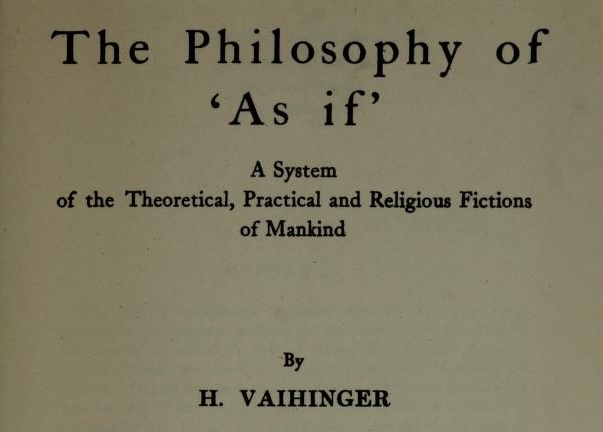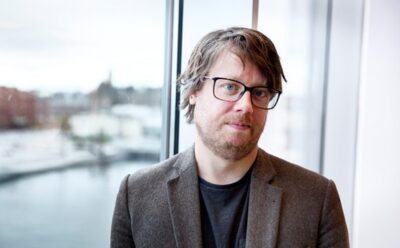Dahlbeck, J. (2023). Fictionalism: The art of teaching truth disguised as lies. Brill.
Fictionalism: The Art of Teaching Truth Disguised as Lies is undoubtedly my most personal book to date. Having almost lost myself in the task of systematically working through different aspects of Spinoza’s philosophy – his ethics, his determinism, his political theory – so as to bring them to bear on questions of education, I felt spent and emptied out of ideas. What eventually saved me from this was pure accident, it seems (as is often the case). A reviewer of my book Education and Free Will noted a connection between my treatment of Spinoza’s notion of free will as a flawed yet necessary idea and Hans Vaihinger’s philosophy of ‘as if.’ This connection was buried in a footnote of my book, and so I have to admit that I hadn’t paid it much mind in the process of writing. The reviewer’s comment led me to look closer at Hans Vaihinger’s near-forgotten book The Philosophy of ‘As If.’ As luck would have it, Routledge had just rereleased the book as part of their series Routledge Classics. This edition contained a substantial foreword by renowned Spinoza scholar Michael Rosenthal. Consider my interest piqued.
The basic idea behind Vaihinger’s philosophy of ‘as if’ is deceptively simple. Because humans are cognitively limited beings and because we lack the means to perceive causal chains beyond the simplest and most basic forms, we need to revert to fictional constructs to be able to advance our understanding. There is a sense in which this resembles Kant’s famous notion of practical postulates (after all, Vaihinger started out as a Kantian), but Vaihinger goes much further than Kant did. Where Kant assumed that practical postulates – acknowledged as expedient fictions – such as the existence of God, the immortality of the soul, and the freedom of the will, were all necessary (yet empirically unconfirmable) concepts, Vaihinger suggests that expedient fictions are all around us, all the time. In fact, for Vaihinger, a precondition for human thought and action is that expedient fictions are used as stepping-stones, allowing for movement between not knowing (and not being able to act) and knowing (and being temporarily able to act). Scientists need to come up with fictional constructs to allow them to flesh out their rudimentary understanding of the world (hence the atomic theory), mathematicians need fictions to allow them to advance their field (hence the concept of infinity), and ordinary people need ethical fictions to ensure the stability of a common moral framework (hence the expedient fictions of good and evil). When we lack information about the world, we can still act ‘as if’ we had this information. Acting ‘as if’ allows for a temporary direction and a sustained movement, but it must also be acknowledged that fictions are just that, fictions. Here’s where Vaihinger sensed that his fellow neo-Kantians had strayed from the path. They began to treat practical postulates as dogmas rather than fictions. But there is a crucial difference between dogmas and fictions. Whereas fictions readily admit to being heuristics that cannot be confirmed or validated through empirical studies – but whose purpose is simply to allow us to take a further step in our striving for a better understanding – dogmas work in the opposite direction. They deny their fictionalist status, and, therefore, they impede thought and action (rather than alleviate it). This is where I sensed that there is a deep pedagogical question embedded in Vaihinger’s philosophy of ‘as if.’ This question seemed to me to suggest an educational aporia that is fundamentally fictionalist at heart: What if we conceive of education as a truth-striving endeavour that always and necessarily begins in fictions?
Here’s where the personal nature of the book begins to make its presence known. The examples I turn to when trying to figure out how education can be conceived as a fundamentally fictionalist endeavour are all personal examples. Drawing on Klaus Mollenhauer’s insight that biography and memory are indispensable tools for the educator (who really has nowhere else to turn), I began to search my own past for clues that could lead me to valuable pedagogical fictions worth unearthing. As a child, I was deeply impacted by Michael Ende’s The Neverending Story (in truth, I was equally enthralled by Wolfgang Petersen’s film adaptation). Thinking back on the book (and the film), there seemed to be a deep sense in which the role of the educator was to allow the child to take a leap of faith, using fictions as springboards. But Bastian is never explicitly given the book that allows him to do this; he steals it. And so I recalled a high school teacher of mine, who slipped me a book (Doctorow’s Ragtime) without explaining his gesture. It was for me to figure out. And so I returned to this memory of a teacher who dared to use fictions as open gestures without demanding to be repaid for it in any way. This led me to think of another teacher – using fictions in a decidedly different (and much more insidious) way. In Mark Twain’s The Mysterious Stranger, Satan becomes a teacher, using fictions not so much as a means to liberate his students but as tools by which to make them afraid to act. This is the shadow side of fictionalism. It cuts both ways. Valuable fiction can turn into dogmas unless we pay sufficient attention to them. As educators, we have a responsibility to be aware of how we use fictions and of how they use us in turn.
I began to see fictions everywhere. Plato’s Republic is set up as a fictional place where roaming through the imaginary lanes of the city is what allows Socrates and his interlocuters to interrogate the concept of justice. Rousseau’s lawgiver is conceived as a fiction necessary for the pedagogical reformation of a people before a people can even be said to exist! And his Emile opens with a clear fictionalist invitation as to who would be able to raise a child without at the same time corrupting him: ‘But let us suppose this marvel found.’ It seemed that every philosophical treatise that has helped shape our shared pedagogical imagination since antiquity was full of expedient fictions. And still fictions are often conceived as the enemy of knowledge. From Paulo Freire’s dismissal of myth as a tool employed by the oppressor to the modern educational obsession with goal attainment and measurability, fictions are often used as symbols of the destructive powers of education. And don’t get me wrong, it’s not that fictions are not dangerous, they are, but so is knowledge. It’s about how we put them to use rather than if we put them to use. On Vaihinger’s account, we have no choice in the matter. Fictions are a necessary way of coping with living in a complex world that refuses to be tamed by the primitive cognitive tools we have at our disposal. And so on the story goes.
But what is really at stake here? In what sense is educational fictionalism not just another abstract philosophical construct doomed to be consigned to the dustbin of history, a remnant of some philosopher of education soon to be long since forgotten about? The question at stake, I believe, is a question of being willing to confront the aporia offered above. If education is indeed a striving for better knowledge, and if every endeavour to move from the relatively unknown to the relatively known involves making use of fictions to get us started, then we have to be willing to confront the fact that fictions have always played an important role for human sense-making. Living in what has been described as a ‘post-truth’ world, this should cause us to critically interrogate the fictions that we rely on to help us move ahead. Rather than sorting out the fictions from the non-fictions, we may want to begin by looking at which fictions can be deemed productive (in the sense that they allow us to respond to the world in ethical ways) and which fictions are to be deemed dogmatic (in the sense that they keep us from seeing the danger signs ahead, and thereby hinder us from taking collective action). If indeed educators are storytellers, then let us make sure that the stories used bring us closer to, rather than further away from, the truth. To respond to the perceived threat of living in a ‘post-truth’ world, allow me to end this short text by quoting the final lines of the book:
We need to act as if we knew where we were going, but, in truth, we mostly don’t. If we did, we wouldn’t need education or public discourse, as we would all simply file along of our own accord. Instead, the search for heuristic fictions allowing us to act ‘as if’ we knew where we were going needs to be ongoing, and it needs to be vigilantly protected from turning into dogmas that perpetuate our misconceptions and render us incapacitated. The best way of protecting this ongoing quest is likely not to lament the weakened position of the truth in our time, but to keep reminding ourselves that we always rely on fictions and that fictions are necessary for approximating the truth. It is my belief that education is where this reminder needs to be kept constantly present.



